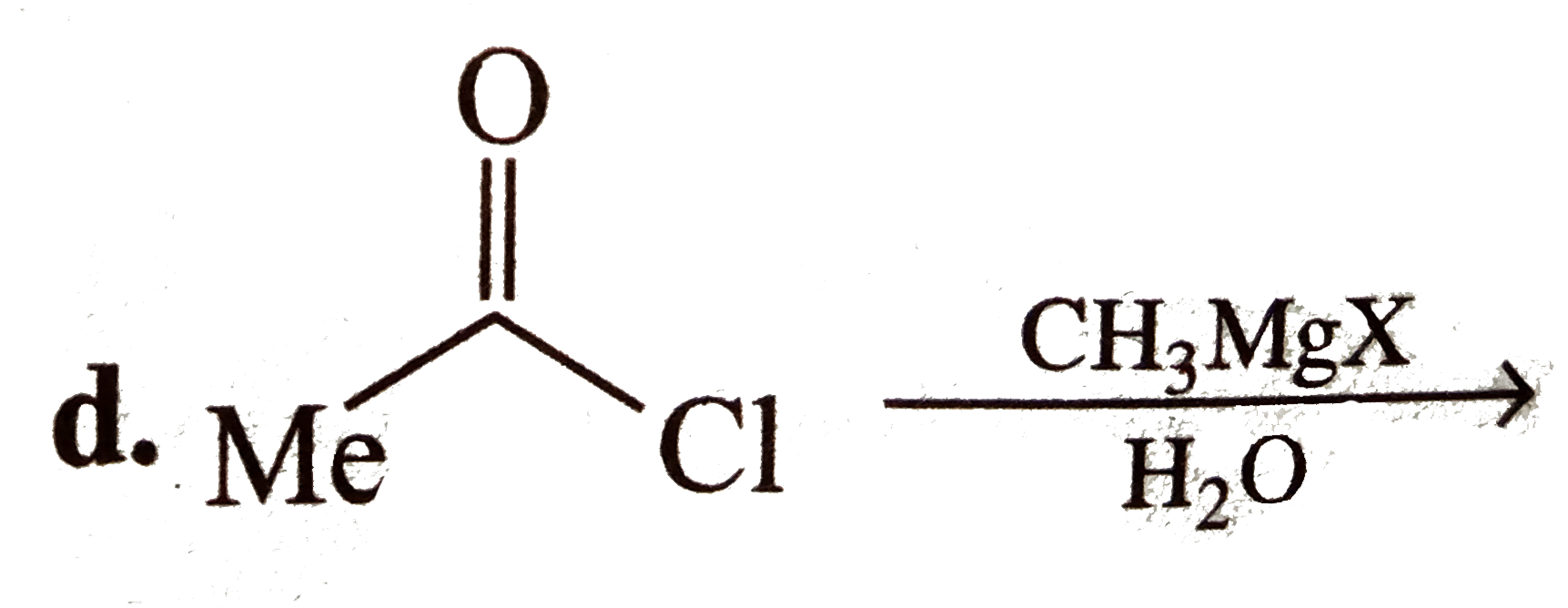Which of the following reactions will not give propane ?




The correct Answer is:D
To determine which of the given reactions will not produce propane, we will analyze each reaction step by step.
Step 1: Analyze Reaction A
- Reaction A involves a chlorine compound reacting with magnesium in ether, followed by the addition of water.
- The chlorine atom is replaced by a methyl group (Me) during the reaction with magnesium, forming a Grignard reagent.
- When water is added, it reacts with the Grignard reagent to form propane (C3H8) and magnesium hydroxide chloride (Mg(OH)Cl).
- Conclusion: Reaction A produces propane.
Step 2: Analyze Reaction B
- Reaction B involves a compound reacting with diborane (B2H6) in ether, followed by the addition of acetic acid (CH3COOH).
- The reaction with B2H6 leads to the formation of a trialkylborane, which upon hydrolysis with acetic acid will yield propane.
- Conclusion: Reaction B produces propane.
Step 3: Analyze Reaction C
- Reaction C involves a chlorine compound reacting with phosphorus and hydroiodic acid (HI).
- The chlorine atom is replaced, leading to the formation of propane.
- Conclusion: Reaction C produces propane.
Step 4: Analyze Reaction D
- Reaction D involves a carbonyl compound (with a double bond to oxygen) reacting with a Grignard reagent (CH3MgX) followed by water.
- The reaction with the Grignard reagent will lead to the formation of an alcohol, not propane. The carbonyl compound does not lead to the formation of propane in this case.
- Conclusion: Reaction D does not produce propane.
Final Answer
The reaction that will not give propane is Reaction D.
---
- Reaction A involves a chlorine compound reacting with magnesium in ether, followed by the addition of water.
- The chlorine atom is replaced by a methyl group (Me) during the reaction with magnesium, forming a Grignard reagent.
- When water is added, it reacts with the Grignard reagent to form propane (C3H8) and magnesium hydroxide chloride (Mg(OH)Cl).
- Conclusion: Reaction A produces propane.
- Reaction B involves a compound reacting with diborane (B2H6) in ether, followed by the addition of acetic acid (CH3COOH).
- The reaction with B2H6 leads to the formation of a trialkylborane, which upon hydrolysis with acetic acid will yield propane.
- Conclusion: Reaction B produces propane.
- Reaction C involves a chlorine compound reacting with phosphorus and hydroiodic acid (HI).
- The chlorine atom is replaced, leading to the formation of propane.
- Conclusion: Reaction C produces propane.
- Reaction D involves a carbonyl compound (with a double bond to oxygen) reacting with a Grignard reagent (CH3MgX) followed by water.
- The reaction with the Grignard reagent will lead to the formation of an alcohol, not propane. The carbonyl compound does not lead to the formation of propane in this case.
- Conclusion: Reaction D does not produce propane.
The reaction that will not give propane is Reaction D.
Topper's Solved these Questions
- BOOK - CENGAGE CHEMISTRY ENGLISHCHAPTER - ALKANES AND CYCLOALKANESEXERCISE - Archives13videos
ALKANES AND CYCLOALKANES
- BOOK - CENGAGE CHEMISTRY ENGLISHCHAPTER - ALKANES AND CYCLOALKANESEXERCISE - MCQ20videos
ALKANES AND CYCLOALKANES
- BOOK - CENGAGE CHEMISTRY ENGLISHCHAPTER - ALKENES AND ALKADIENESEXERCISE - Single correct Answer14videos
ALKENES AND ALKADIENES
Similar Questions
Knowledge Check
- Question 1 - Select One
Which of the following reaction will not give primary amine ?
ACH3CONH2Br2/KOH−−−−−−→BCH3CNLiAIH4−−−−→CCH3NCLiAIH4−−−−→DCH3CONH2LiAIH4−−−−→ - Question 2 - Select One
Which of the following reaction will not give ether as a major product?
ACH3CH2Cl+Ag2(dry)→B(CH3)3CCl+CH3CH2O−Na+→C DCH3Cl+Na+O−−CH3∣C∣CH3−CH3→
DCH3Cl+Na+O−−CH3∣C∣CH3−CH3→ - Question 3 - Select One or More
Which of the following reactions will give alkyne?
A B
B CH3C−Br∣C∣Br−Br∣C∣Br−CH3Zn,Δ−−−→DH3C−C≡CHHg+2,H2SO4−−−−−−−−→
CH3C−Br∣C∣Br−Br∣C∣Br−CH3Zn,Δ−−−→DH3C−C≡CHHg+2,H2SO4−−−−−−−−→
Which of the following reactions would give propanal ?
View SolutionWhich of the following reactions will give alkyne?
View SolutionWhich of the following reactions will give identical products ?
View SolutionWhich of the following reaction will give racemic mixture?
View SolutionWhich of the following reactions will give ether as main product?
View Solution

